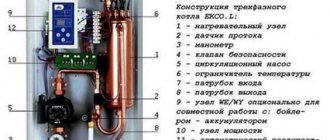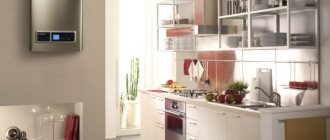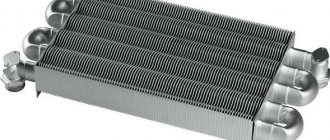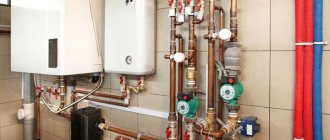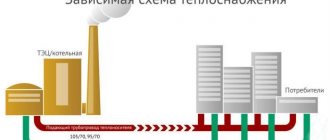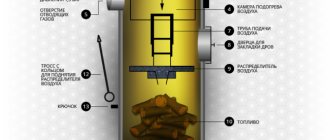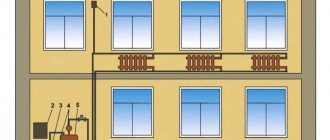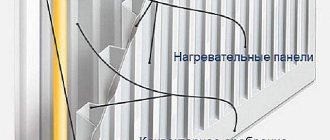Residents of apartments who have decided to abandon central heating, as well as owners of private houses, have plenty to choose from. For autonomous heating, gas and electric systems are used - boilers, heated floors, infrared and oil heaters, convectors. In medium-sized or large-sized rooms, it is advisable to install boilers that run on electricity or gas. Let's look at the first type of heaters, the features of their installation in an apartment, the rules of choice, as well as all the pros and cons that electric boilers have.
How to abandon central heating and switch to individual heating is written here.
Why is an electric heating boiler better than a gas one?
Despite the fact that gas is a cheaper source of energy than electricity, installing gas equipment is not always preferable. The main obstacles to installing a boiler of this type are:
- Difficulties with obtaining permission, coordination and preparation for installation. The room must have a properly organized ventilation system and removal of combustion products.
- High cost of equipment and labor intensive installation. And if we are talking about a private house where gas is not supplied, then the costs increase significantly.
- Potential danger of the fuel itself and its combustion products.
Advantages of electric heating systems
Electric boilers have many advantages, including:
- High reliability in terms of fire safety (of course, subject to the availability of high-quality wiring and fuses).
- Low installation costs, easy installation.
- Wide price range, choice of functions. In general, electric models are cheaper than gas models. You can choose a simple boiler, consisting of a set of heating elements and a primitive control system, which will cost very little. If there are no financial restrictions, you should pay attention to automated devices. They are able to maintain a given temperature with minimal energy consumption and have several programming modes, a GSM controller that allows you to regulate the operation of the device from a distance, and other useful options.
- Compact and aesthetically pleasing. In many modern models, all the necessary elements - a circulation pump, an expansion tank, an air vent, protection systems - are hidden inside the housing. If desired, the electric boiler can be installed in any room of the apartment. The most common are wall-mounted varieties.
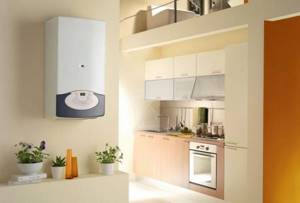
- Ease of use. To control the device you only need to press a few buttons. Electric boilers do not require control or participation in their operation.
- Silence. The owners can only hear the quiet hum of the induction device or the hum of the automation units.
- There is no need for coordination with relevant organizations when the device power does not exceed 9 kilowatts.
- High efficiency.
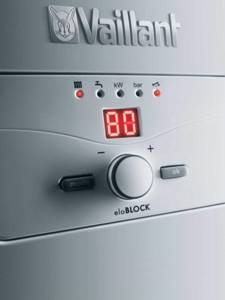
Why electric heaters?
You will immediately ask yourself why classic water or stove heating of rooms is not considered? The answer is simple - this is due to the fact that installation work and maintenance for approximately the same money will be reduced to a minimum.
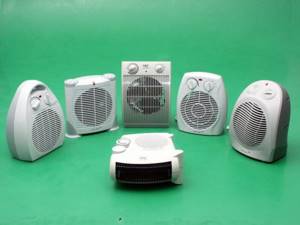
Now we will provide several reasons why it is obvious that the best and most economical heating system for a private home is electric.
- Electric heaters are silent, do not require additional resources (coal, firewood, liquid fuel) and do not pollute the atmosphere. This means that in a private house there is no need to have space in the utility room for fuel, make a chimney, and also remove soot every year. All you need to do is connect the system to the network and enjoy the warmth.
- Installing an entire electric heating system does not require a huge upfront cash investment. For example, installation of a water heating main is carried out once. A project is created, all pipes, radiators, a boiler, as well as additional automation are purchased. You will not be able to complete part of the work (for example, in one room), and if you have money, you will not be able to complete the project over time, and if you succeed, many problems will arise. It will be necessary to drain the water, cut into the finished highway, etc. In the case of electric heaters, everything is much simpler. You can install equipment in each room separately as you earn money. At the end of spring, buy convectors for the bedroom, later - for the kitchen, bathroom, etc.
- Today there are many ways to save on energy consumption. Of course, this option requires considerable expenses, but rest assured, over time they will pay for themselves. The installation of economical two-tariff meters, as well as solar panels on the roof of the house, is popular.
- You can connect a boiler, boiler or even a convector yourself, significantly saving money on calling a technician.
As you can see, electric heating in a private home really outperforms alternative options, so installing such a system is quite profitable.
We bring to your attention a video example of creating a cheap and at the same time effective autonomous system:
Disadvantages and difficulties of operating electric boilers
The advantages of electric boilers look attractive. But they also have disadvantages, and very significant ones.
- High cost of electricity.
Note! Costs can be reduced several times by insulating the apartment, using preferential electricity tariffs and choosing a device with precise adjustment.
- Requirements for the type of radiators. In an electrically heated system, it is uneconomical to use cast iron and steel batteries. It is advisable to choose bimetallic or, as a last resort, aluminum heating devices.
- Complete dependence on power supply.
- Demanding on the quality and composition of the coolant.
- When installing equipment that consumes more than 9 kW, instead of a standard 220 V network, a three-phase 380 V network will be required. If the apartment does not have one, you must obtain special permission for the installation, which is not always possible in old houses.
USEFUL INFORMATION: Stages and features of apartment renovation in new buildings from scratch
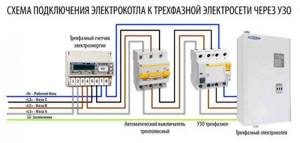
Before you decide to purchase and install an electric boiler, you need to weigh all the pros and cons, calculate the approximate electricity consumption per month and think about how significant it will be for the budget.
Decentralized heating
The best option for independent heating is to install an individual electric boiler in each apartment. What are the advantages of using this type of electricity:
- The system has no heat loss. They can only arise due to external factors - poorly insulated surfaces, intensity of use of doors or windows, and so on.
- The user sets the temperature inside the room independently - it does not depend on the initial supply of coolant, unlike the first option.
- The apartment is heated at any time, regardless of the season or time of day.
- With such a system, it is not difficult to make a warm floor yourself.
- Payment for heat supply depends only on the electricity used. There are no additional payments for the reconstruction of equipment, repair of networks and other things that they like to charge apartment owners with.
- The unit does not take up much space, does not require a separate outlet for combustion products, the power is enough to heat a large area + generate energy for heating water.
The downside may be purchasing a package of documents allowing you to install these networks in the apartment and remove unnecessary radiators. And also obtain approval from energy system services, which must first calculate the possibility of installing an individual boiler - both actions are fraught with bureaucratic red tape, but with the persistence of the user, it is possible to achieve a decision in their favor.
Electric boilers with heating elements (tubular heaters)
Such boilers work on the same principle as most household electrical appliances - kettles, boilers, irons. They are most in demand among consumers and are presented in a wide variety of models. There can be several heating elements, and they are turned on together or alternately.
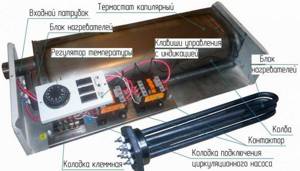
Pros:
- simplicity of design;
- reliability of the circuit, ease of repair.
Minuses:
- high inertia of boilers - slow heating at startup;
- demands on the quality of the coolant. The tendency for scale to form, which reduces heating efficiency, forces special measures to be taken. You can install anode rods that will collect salt deposits on themselves, and change them at certain intervals, just like the heating elements themselves. But it is better to use specially prepared water or a special coolant.
Induction devices
Induction boilers are energy-efficient and reliable devices that can operate for years without maintenance or repair.
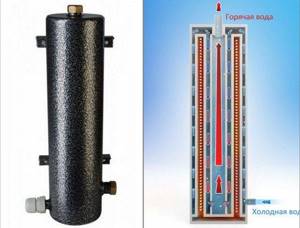
Pros:
- thanks to the phenomenon of self-induction, they significantly save energy (up to 30% during the heating season);
- undemanding to the composition of the coolant (scale does not appear in such boilers);
- service life - from 30 years, the likelihood of breakdown due to the design features is very low;
- quick heating of the coolant;
- possibility of precise adjustment.
Minuses:
- large mass (from 30 kg) - strong brackets are used for hanging, the wall must be able to withstand the load;
- circulation pump, expansion tank, safety group are purchased and installed separately;
- relatively high cost;
- vibration noise during operation.
How to save on electricity in an apartment?
Thermostats help to significantly save energy consumption. Thanks to them, it is possible to determine the optimal temperature regime and not overuse the resource. Additionally, it is also recommended to use a multi-tariff meter. With its help it will be possible to reduce consumption at night. Heat can escape through walls or windows. That is why they should be carefully insulated. Proper thermal insulation can save up to 40%.
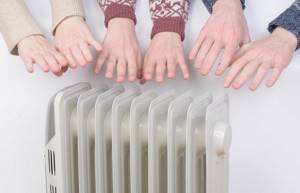
Ionic (electrode) heating boilers
Such devices heat the coolant by applying voltage through the electrodes, resulting in the ionization of molecules and their movement towards a conductor with a different polarity. In a single-phase network, one electrode is used in the form of a rod, the second is the surface of a metal cylinder, with three-phase voltage - 3 electrodes.
USEFUL INFORMATION: How to install an electricity meter yourself?
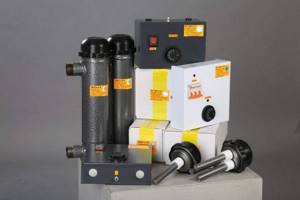
The sizes of ion boilers vary from very small ones, capable of heating only one battery, to large installations designed for a large house. Available both with and without casing.
Pros:
- compactness. The device without a housing takes up little space;
- high-speed heating of the coolant;
- low inertia, allowing very precise adjustment;
- resistance to voltage surges;
- high level of safety - if there is no coolant in the boiler, it simply cannot work;
- low price (without control unit, pump and expansion tank).
Minuses:
- complete incompatibility with batteries made of steel and cast iron;
- demands on the quality of the circulating fluid, which must have a balanced composition. It is recommended not to make it yourself, but to purchase a ready-made one;
- the need for a specialist to check the condition of the coolant before the new heating season;
- special requirements for the grounding loop;
- heating temperature – no higher than 75 °C;
- the need to replace electrodes at certain intervals.
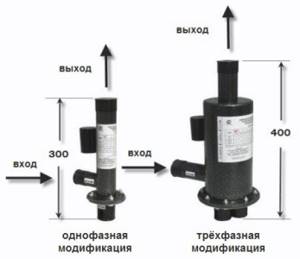
Method 7 - infrared heaters (the most economical)
Infrared heaters are considered the most economical of all types of electric heaters. They do not need heating elements and water pipes. Infrared heaters heat objects, not the room. Then the heated objects heat up the air. If an electric boiler can be compared to a kettle, then an infrared boiler can be compared to a microwave oven.
Infrared panels are especially popular. They are installed on the ceiling or walls of residential and industrial premises. Since the heating area is increased, the room becomes warmer faster than usual. Such a panel can be used as an independent heating source or as an addition to an existing system. An infrared heater goes well with electrode boilers. For example, an infrared heater can only be turned on in spring and autumn, when it is too early to turn on the main heating, or when it suddenly gets cold outside.
Pictured is a GROHE infrared panel, Germany
Single-circuit and double-circuit boilers: what is the difference?
Let's look at the differences between the two modifications of these units.
- Single-circuit boilers are designed only for heating the room. At the same time, an indirect heating boiler can be connected to all modern boilers and hot water supply can be provided.
- Double-circuit, in addition to participating in the heating system, heat water for domestic needs. Their design provides an additional heat exchanger, which can be flow-through or storage - in the form of a built-in water heating tank.
Note! A double-circuit boiler cannot operate on 2 circuits at the same time. When you open a hot water tap, heating of the heating fluid stops.
Let us briefly describe their advantages and disadvantages.
Advantages of a single-circuit boiler:
- relatively low cost;
- high efficiency and high power;
- lower energy consumption (no boiler).
Minuses:
- if necessary, you will have to install an additional boiler to heat water;
- together with an indirect heating boiler, the design looks bulky and unaesthetic.
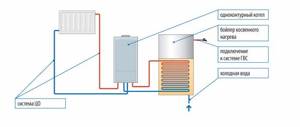
Advantages of a dual-circuit device:
- quite compact size;
- easy installation.
Minuses:
- instability of water pressure and temperature;
- high requirements for coolant quality and maintenance;
- high cost.
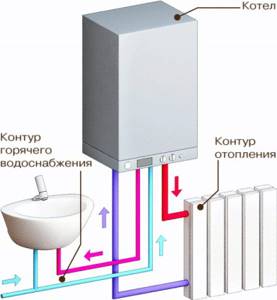
Note! If we compare the prices of a double-circuit boiler and a device with one circuit and an additional boiler, the first will cost less.
It's difficult to say which boiler is better. If it is important to save energy, as well as space in the apartment, you should choose a double-circuit version. This device heats water only when it is needed; the single-circuit device will turn on every time the liquid cools down. At the same time, a single-circuit boiler is considered more reliable and convenient to use.
Advice. If your automated boiler has an additional storage tank, it can be programmed to heat water at night when electricity rates are lower. During the day, when the cost of electricity is higher, you can use already heated water.
How to increase efficiency and reduce costs?
Simply buying an economical electric heater and installing it in a country house is only half the battle. At the same time, it is far from a fact that as a result of the work you will be able to verify the significant efficiency of the economical heating system made. The reason for this may be poor thermal insulation of the room. All kinds of cracks, gaps in windows and even the lack of insulation on the walls contribute to the rapid cooling of the room. It has been proven more than once that with high-quality insulation of walls and ceilings, heating efficiency can increase to 80%, although this figure usually reaches 40%.
Another important nuance is the use of automation. For example, if no one is at home all day (everyone is working), then there is no point in heating the rooms. It would be more correct to install a controller that will turn on the heaters an hour or two before your arrival. This time will be enough to completely heat the premises.
It is also necessary to correctly draw up a project for an economical heating system for a private home, selecting the power and installation locations of the heaters. Well, the last of the most effective solutions is to install a multi-tariff meter. This device allows you to save electricity at night, when the heater will operate.
To summarize, I would like to note that the cheapest heating system with electricity is convectors and infrared panels. We hope that the information was useful and interesting for you!
Also read:
Content
Power
The power of the boiler is its most important characteristic, which means you need to choose it correctly. Sometimes it is tied to the footage and calculated based on the value of 1 kW per 10 m2. This formula is only suitable for a very rough estimate.
USEFUL INFORMATION: How to paint wooden floors in an apartment: review of materials
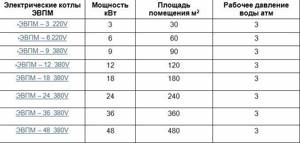
In fact, you need to focus on heat loss. If, for example, they are 8 kW, then you need a boiler of the same power. The calculations take into account:
- area and height of the room;
- degree of insulation of walls, floors, ceilings;
- the number of external walls and their location according to the cardinal directions;
- number, dimensions and type of windows;
- battery connection diagram;
- region of residence and other parameters.
To correctly calculate the boiler power, it is recommended to use special calculators or seek advice from a heating engineer.
Additional functions
The following functions of electric boilers may be useful:
- protection systems – from overheating, short circuit, overpressure;
- the ability to install a GSM controller, which will allow you to remotely adjust the temperature in the apartment, change the boiler settings, and send notifications about possible problems;
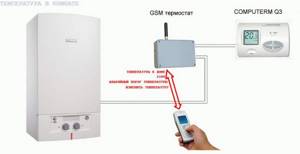
- a control unit with energy-saving modes that allow you to reduce the temperature at certain periods of time - at night, when residents are not at home;
- smooth power adjustment. This option is more convenient and profitable than the stepped one.
Note! Often control units are not included in the package of electric boilers. In this case, they will have to be purchased separately.
Popular models
Among the variety of brands, the leading positions in the ranking are occupied by the following manufacturers:
- Protherm (Slovakia),
- Vaillant (Germany),
- Kospel (Poland),
- Buderus (Germany).
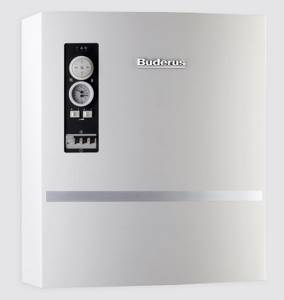
Among Russian brands, buyers give preference to 4 brands, including:
- "TEPLODAR"
- "EVAN"
- ZOTA,
- "RusNIT".
The best models from the category of medium-power boilers that are suitable for apartments, based on user reviews:
- Teplodar Sputnik 6 (8.1 thousand rubles);
- RusNit 208M (average price - 16 thousand rubles);
- EVAN Warmos-IV-5 (16.5 thousand rubles);
- ZOTA 12 Lux (RUB 21.4 thousand);
- Kospel EKCO L2 12 (37 thousand rubles);
- Protherm Skat 12 KR 13 (32.5 thousand rubles);
- Vaillant eloBLOCK VE 12 (35 thousand rubles);
- Buderus Logamax E213-10 (9.3 thousand rubles).
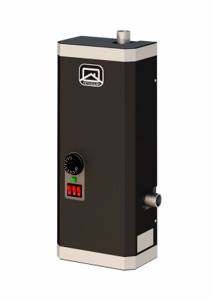
Teplodar Sputnik 6 in black
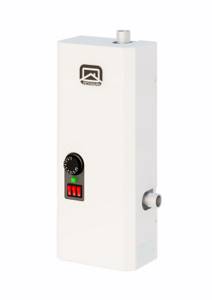
Teplodar Sputnik 6 in white
